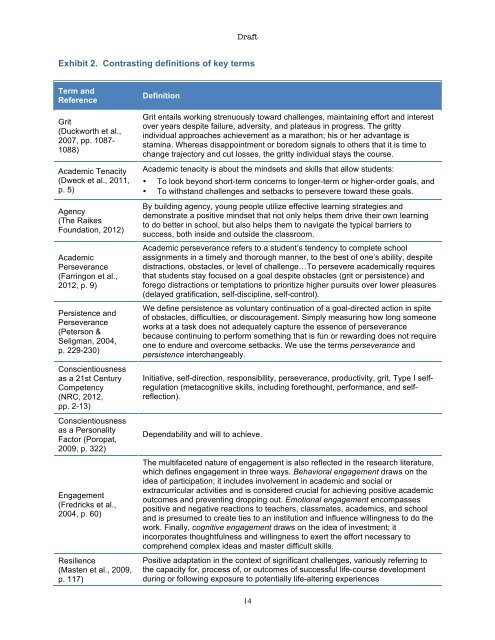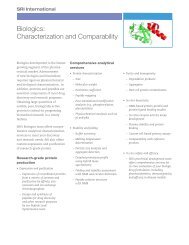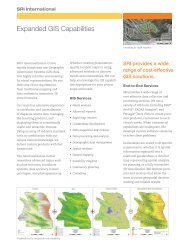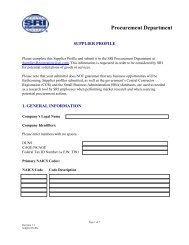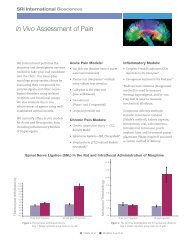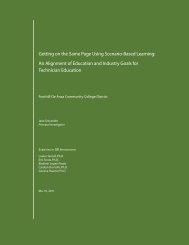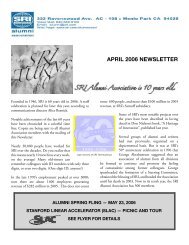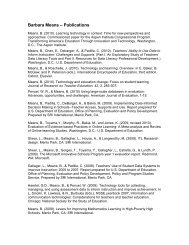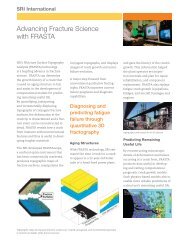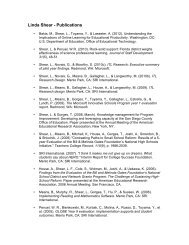Promoting Grit, Tenacity, and Perseverance - U.S. Department of ...
Promoting Grit, Tenacity, and Perseverance - U.S. Department of ...
Promoting Grit, Tenacity, and Perseverance - U.S. Department of ...
You also want an ePaper? Increase the reach of your titles
YUMPU automatically turns print PDFs into web optimized ePapers that Google loves.
Draft<br />
Exhibit 2. Contrasting definitions <strong>of</strong> key terms<br />
Term <strong>and</strong><br />
Reference<br />
<strong>Grit</strong><br />
(Duckworth et al.,<br />
2007, pp. 1087-<br />
1088)<br />
Academic <strong>Tenacity</strong><br />
(Dweck et al., 2011,<br />
p. 5)<br />
Agency<br />
(The Raikes<br />
Foundation, 2012)<br />
Academic<br />
<strong>Perseverance</strong><br />
(Farringon et al.,<br />
2012, p. 9)<br />
Persistence <strong>and</strong><br />
<strong>Perseverance</strong><br />
(Peterson &<br />
Seligman, 2004,<br />
p. 229-230)<br />
Conscientiousness<br />
as a 21st Century<br />
Competency<br />
(NRC, 2012,<br />
pp. 2-13)<br />
Conscientiousness<br />
as a Personality<br />
Factor (Poropat,<br />
2009, p. 322)<br />
Engagement<br />
(Fredricks et al.,<br />
2004, p. 60)<br />
Resilience<br />
(Masten et al., 2009,<br />
p. 117)<br />
Definition<br />
<strong>Grit</strong> entails working strenuously toward challenges, maintaining effort <strong>and</strong> interest<br />
over years despite failure, adversity, <strong>and</strong> plateaus in progress. The gritty<br />
individual approaches achievement as a marathon; his or her advantage is<br />
stamina. Whereas disappointment or boredom signals to others that it is time to<br />
change trajectory <strong>and</strong> cut losses, the gritty individual stays the course.<br />
Academic tenacity is about the mindsets <strong>and</strong> skills that allow students:<br />
• To look beyond short-term concerns to longer-term or higher-order goals, <strong>and</strong><br />
• To withst<strong>and</strong> challenges <strong>and</strong> setbacks to persevere toward these goals.<br />
By building agency, young people utilize effective learning strategies <strong>and</strong><br />
demonstrate a positive mindset that not only helps them drive their own learning<br />
to do better in school, but also helps them to navigate the typical barriers to<br />
success, both inside <strong>and</strong> outside the classroom.<br />
Academic perseverance refers to a student’s tendency to complete school<br />
assignments in a timely <strong>and</strong> thorough manner, to the best <strong>of</strong> one’s ability, despite<br />
distractions, obstacles, or level <strong>of</strong> challenge…To persevere academically requires<br />
that students stay focused on a goal despite obstacles (grit or persistence) <strong>and</strong><br />
forego distractions or temptations to prioritize higher pursuits over lower pleasures<br />
(delayed gratification, self-discipline, self-control).<br />
We define persistence as voluntary continuation <strong>of</strong> a goal-directed action in spite<br />
<strong>of</strong> obstacles, difficulties, or discouragement. Simply measuring how long someone<br />
works at a task does not adequately capture the essence <strong>of</strong> perseverance<br />
because continuing to perform something that is fun or rewarding does not require<br />
one to endure <strong>and</strong> overcome setbacks. We use the terms perseverance <strong>and</strong><br />
persistence interchangeably.<br />
Initiative, self-direction, responsibility, perseverance, productivity, grit, Type I selfregulation<br />
(metacognitive skills, including forethought, performance, <strong>and</strong> selfreflection).<br />
Dependability <strong>and</strong> will to achieve.<br />
The multifaceted nature <strong>of</strong> engagement is also reflected in the research literature,<br />
which defines engagement in three ways. Behavioral engagement draws on the<br />
idea <strong>of</strong> participation; it includes involvement in academic <strong>and</strong> social or<br />
extracurricular activities <strong>and</strong> is considered crucial for achieving positive academic<br />
outcomes <strong>and</strong> preventing dropping out. Emotional engagement encompasses<br />
positive <strong>and</strong> negative reactions to teachers, classmates, academics, <strong>and</strong> school<br />
<strong>and</strong> is presumed to create ties to an institution <strong>and</strong> influence willingness to do the<br />
work. Finally, cognitive engagement draws on the idea <strong>of</strong> investment; it<br />
incorporates thoughtfulness <strong>and</strong> willingness to exert the effort necessary to<br />
comprehend complex ideas <strong>and</strong> master difficult skills.<br />
Positive adaptation in the context <strong>of</strong> significant challenges, variously referring to<br />
the capacity for, process <strong>of</strong>, or outcomes <strong>of</strong> successful life-course development<br />
during or following exposure to potentially life-altering experiences<br />
14


